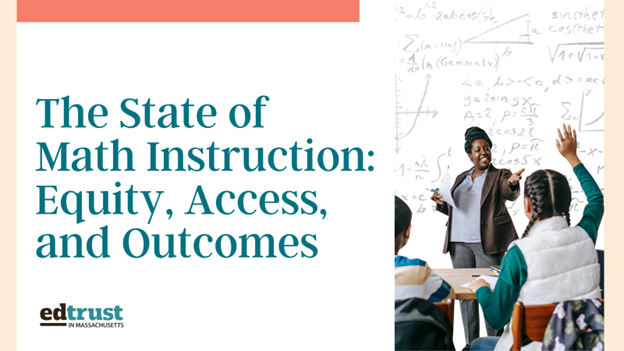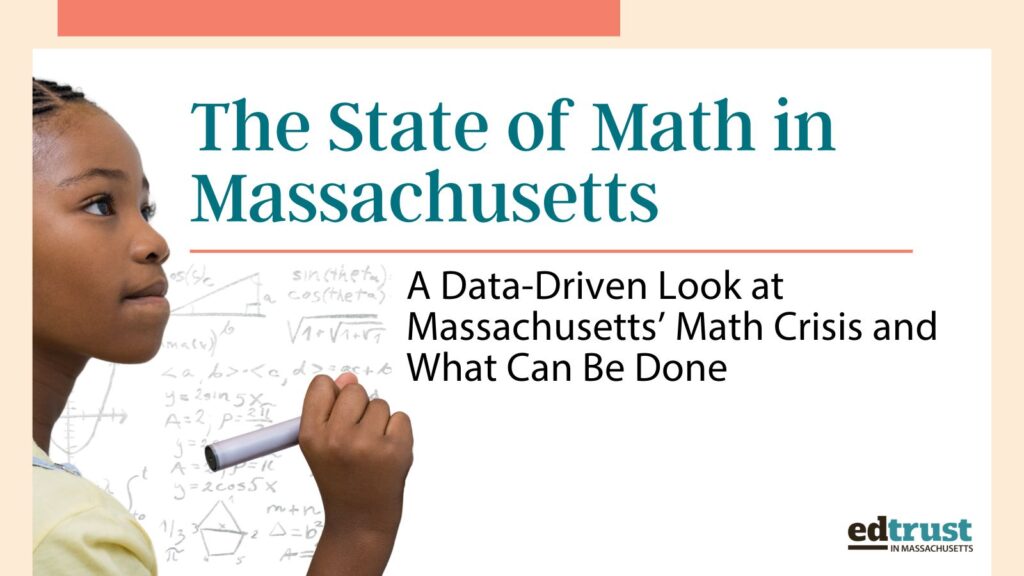Opportunities Denied: High-Achieving Black and Latino Students Lack Access to Advanced Math
In this brief, EdTrust and Just Equations explore why high-achieving Black and Latino students and students from low-income backgrounds who take and pass Algebra I in eighth grade still end up taking advanced math courses in high school at lower rates than their peers.

December 07, 2023 by
Melodie Baker,
Ivy Morgan,
Gizella Wade
For this brief, The Education Trust and Just Equations partnered to explore differences in patterns of math course enrollment for high school students using data from students who participated in the 2009 High School Longitudinal Study (HSLS:09). Like other research has shown, we find that high-achieving Black and Latino students and students from low-income backgrounds who take and pass Algebra I in eighth grade still end up taking advanced math courses in high school at lower rates than their peers. The data also points to the likelihood that students who did and did not take advanced math courses in high school have different experiences with math teachers’ and counselors’ practices and perceptions. Below are the key findings:
- High-achieving underrepresented students who took advanced math courses had higher four-year graduation rates and high school GPAs, as well as higher postsecondary matriculation and persistence rates, STEM credit-earning, and GPAs than their high achieving underrepresented peers who did not.
- Among high-achieving underserved students, there are meaningful (but not statistically significant) differences in the school experiences of those who took advanced math courses, compared with peers who did not take advanced math courses. Notable differences include:
- High-achieving, underserved students (i.e., Black and Latino students and students from low-income backgrounds) who took advanced math courses differed from peers who did not take advanced math courses in that they more commonly had math teachers who set clear goals and school counselors who set high standards.
- Among high-achieving Black students, those who took advanced math courses differed from peers who did not take advance math courses in that they more commonly had math teachers who set high standards for students’ learning, cared about students of all academic levels, and expected more from students.
- Most students who took advanced math courses more commonly reported that they felt safe in and proud of their school — but that was not true for Black students.
The report concludes with recommendations that federal and state policymakers can take to address the longstanding, institutional challenges that deny high-achieving Black and Latino students and students from low-income backgrounds access to the higher-level math courses that will put them on a path to achieving their dreams.
Related

December 16, 2025 by
EdTrust-Massachusetts
This research brief illuminates two foundational pillars of effective math education in Massachusetts: the adoption and implementation of high-quality math curricula, and the availability of educators capable of delivering rigorous and engaging math instruction

April 24, 2025 by
EdTrust
Math proficiency has sharply declined across the nation, and recent data shows that many Massachusetts students are entering higher education unprepared for the mathematical demands of college, careers, and beyond

April 05, 2018 by
Keith Dysarz
Nearly every state includes measures of college- and career-readiness in their accountability plans under the Every Student Succeeds Act,…







